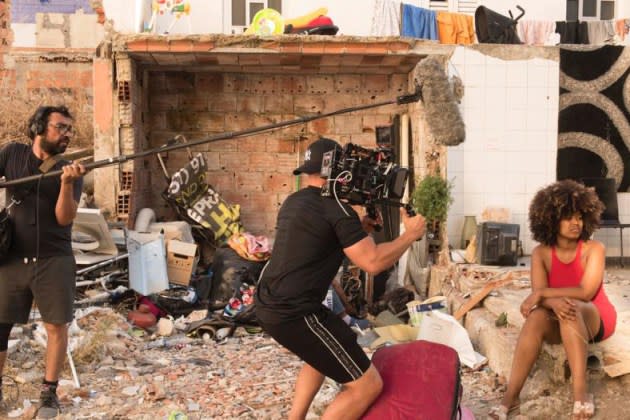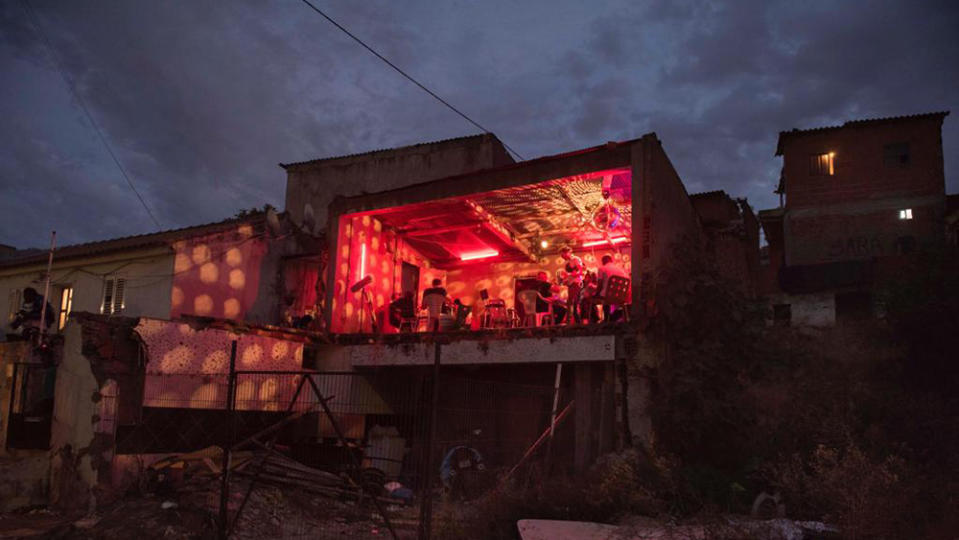‘The End of the World’ Director Basil Da Cunha Reveres Cape Verde, Lisbon’s Reboleira in Locarno Title ‘Manga d’Terra’

Basil Da Cunha’s third feature, “Manga d’Terra,” bowed in Locarno’s main Competition on Friday, a strand that highlights contemporary cinema and innovative global debuts from established and emerging cineasts.
His debut, “After the Night,” played the Cannes Festival’s Directors’ Fortnight in 2013, while his follow-up, “The End of the World,” screened in Locarno’s main competition in 2019.
More from Variety
A Swiss-Portuguese co-production that teams Da Cunha with Palmyre Badnier and Nicolas Wadimoff of Geneva-based Akka Films (“The Hunter’s Son”), “Manga d’Terra” continues his fervent dive into Lisbon’s Reboleira district and its rich Cape Verdean culture.
“Working with Basil Da Cunha, accompanying him in his creative process, means embracing a singular way of doing things which calls on a number of parameters, human as well as technical and economic, far removed from those usually used in the world of cinema,” Wadimoff told Variety.
“It’s a very organic way of looking at cinema, one that’s highly written and prepared in advance, while leaving plenty of room for reality to unfold in all its complexity. It’s a question of constantly finding the right balance between organization and improvisation, with the utmost respect for the people involved in the film. It’s a relationship with the cinema that continually questions and searches, completely in line with what drives us at Akka Films.” he added.
Having lived in the neighborhood for 15 years, the director captures its residents intimately, decimating boundaries while shooting with a small team that grants him ease of access. Incorporating locals to act in the projects since curating his first short film, he likens the dynamic to that of a big family or theater troupe.
“Manga d’Terra” centers on Rosinha, who moves to the area after leaving her children behind to better provide for them. Through a rotation of living arrangements, she adapts to barrio hierarchies by escaping on music-filled sojourns, simultaneously met with grace and disappointment.
“It was important to pay homage to this culture, to these new artists and the way they live this music, feel this music and the way they mix this music with other styles. Then, we have the Creole text of the music. It’s poetry, not easy to translate in the subtitles because it’s so beautiful,” Da Cunha relayed.

The protagonist, played by musician Eliana Rosa, joins a female-led primary cast who anchor the film, living their full-spectrum lives, from humor and hope to tenacious vulnerability. The characters are textured, bound by similar circumstances yet wholly individual, allowed to be walking contradictions that carry the weight of lived experiences on their shoulders.
“In the last movie I made, I had many good scenes with women, but they didn’t fit into the movie, so I cut them,” De Cunha lamented. “It wasn’t easy and that was the motivation for this film, to give space to the women of the community. Cinema can create new heroes and we need more female heroes.”
De Cunha incorporates a fusion of funk, zouk rock and jazz that lays atop prosaic Cape Verdean tunes into the film; it acts as a tether but also a dose of liberation for Rosinha, a tribute to all facets of her womanhood. Musicians Henrique Silva and Luis Firmino add their talents to the project, rounding out the real-time score.
“When she’s singing, we don’t know if she’s dreaming or not. But we know that’s the response to something that the movie can’t show, something inside the soul of this character. The only way to portray that was to use music to mix reality and dream,” stated Da Cunha.
The film culminates with the original song Manga Terra, composed by the Acacia Maior collective and sung by Rosinha. It’s a sultry finale that opines on her journey as an immigrant, bringing her essence and that of her homeland to a new space, able to ripen like the cherished Mango fruit, even when a new environment challenges its growth and maturation.
In the end, Rosinha’s circumstances mirror those of the neighborhood, which faces upheaval, gentrification not only decimating the structures but displacing a vibrant and culture-filled community that set off from Cape Verde for more robust opportunities in Portugal.
Provoking discussions of a culture appropriated, “Manga D’terra” is a testament to hard-fought battles against assimilation amidst the loss of heritage and home.
Da Cunha’s upcoming “O Jacaré” (“The Alligator”), which follows a string of thefts in the tight-knit community, will cement its legacy, the footage some of the last to archive the Reboleira, the end of an era.
“It’s a really hard situation. It’s an old world, a way of living together that they’re killing. That’s the worst part because it’s really a place where if you fall, somebody helps you to get up. If you’re hungry, somebody gives you food. It’s a place of happiness and joy. It’s really sad to see the end of this world.”

Best of Variety
Sign up for Variety’s Newsletter. For the latest news, follow us on Facebook, Twitter, and Instagram.

